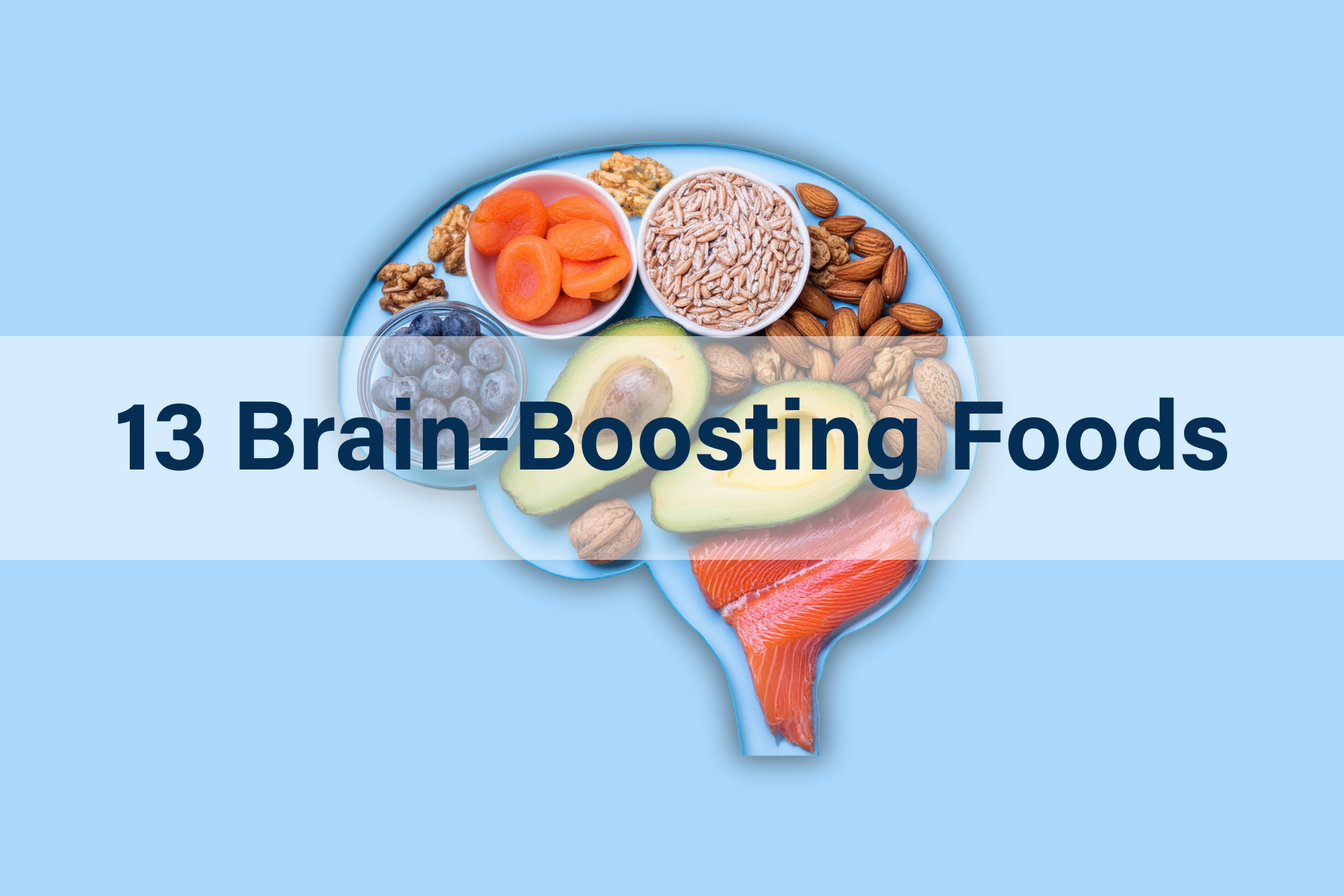
The 13 Best Brain Foods for Boosting Focus and Memory
Article At a Glance
|
Why Brain Nutrition Matters
Your brain is more than just another organ—it is the control centre for everything you do. From keeping your heart beating to helping you concentrate in a meeting or exam, your brain is constantly at work. To fuel this remarkable system, you need more than calories. You need vitamins, minerals, antioxidants, and other compounds that keep your brain cells firing at their best.
Think of it like filling a high-performance car. Low-quality fuel might get you from point A to point B, but it will wear down the engine over time. Similarly, refined and heavily processed foods may provide energy, but they don’t supply the nutrients that protect and enhance your brain. Choosing brain-friendly foods and natural nootropics gives your body premium-grade fuel for sharper thinking and long-lasting mental clarity.
The Top 13 Brain Foods for Focus and Memory
1. Coffee

Coffee is more than just a morning ritual. Caffeine enhances alertness, concentration, and mood by blocking adenosine, a neurotransmitter that makes you feel drowsy. Studies show that moderate coffee intake can improve reaction time and memory, making it one of the most reliable natural brain boosters.[1]
2. Berries

Blueberries, strawberries, and raspberries are rich in antioxidants that help combat oxidative stress. These compounds support communication between brain cells and may even delay age-related decline in memory and cognition.[2]
3. Green Tea

Green tea combines gentle caffeine stimulation with L-theanine, an amino acid that promotes calm focus without jitters. Research has shown that habitual green tea drinkers often have stronger cognitive performance compared to non-drinkers. It is an excellent choice for sustained mental energy.[3]
4. Avocados

Avocados are packed with healthy monounsaturated fats that improve blood flow and support healthy blood pressure. Since high blood pressure can impair memory and concentration, avocados play a protective role in brain health.[4]
5. Dark Chocolate

Dark chocolate provides flavonoids—plant compounds with strong antioxidant effects. These flavonoids accumulate in regions of the brain involved in learning and memory. Just a small portion of dark chocolate can provide a quick and healthy brain boost.[5]
6. Ginseng

Panax ginseng has been used in traditional medicine for centuries. Scientific studies suggest it may improve psychological function, reduce fatigue, and even support immune health.[6]
As a natural nootropic, it holds promise for enhancing brain resilience under stress.
7. Oily Fish

Salmon, sardines, and mackerel are rich in omega-3 fatty acids, vital for building and maintaining brain cell membranes. They also provide iodine, zinc, and magnesium, which work together to support overall cognitive performance.[7]
8. Eggs

Eggs are one of the best natural sources of choline, a nutrient essential for producing acetylcholine, a neurotransmitter involved in mood regulation and memory. With additional B vitamins, eggs support both mental energy and emotional balance.[8]
9. Peanuts

Peanuts offer unsaturated fats, resveratrol, and vitamin E. These nutrients reduce oxidative damage, keeping neurons healthy and slowing down cognitive decline. Simple and affordable, peanuts are a snack with real brain benefits.[9]
10. Turmeric

The active compound in turmeric, curcumin, has strong anti-inflammatory and antioxidant properties. Research suggests it may improve memory and mood, particularly in older adults. Adding turmeric to your diet is a delicious way to protect brain health.[10]
11. Seeds

Pumpkin seeds, sunflower seeds, and flaxseeds are small but mighty.[11] They provide zinc for nerve signalling, magnesium for stress regulation, and omega-3s for overall brain vitality.
12. Broccoli and Cruciferous Vegetables

Broccoli, kale, and Brussels sprouts contain antioxidants and vitamin C that strengthen brain defences against stress. Their flavonoid content also plays a role in supporting memory.[12]
13. Nuts

Walnuts in particular are linked to better cognitive performance due to their high levels of polyphenols and healthy fats. Eating a handful of mixed nuts regularly can protect against age-related cognitive decline.[13]
Beyond Food: The Role of Natural Nootropics
While a balanced diet lays the foundation for brain health, many people also turn to nootropics—compounds that enhance cognitive function. Some nootropics occur naturally in foods, such as Panax ginseng or L-theanine in green tea. Others are formulated into supplements that combine vitamins, minerals, and adaptogens designed for mental clarity and stress resilience.
In Australia, interest in nootropics has grown rapidly as people search for healthier alternatives to constant coffee consumption or sugary energy drinks. Modern nootropic blends can include ingredients such as:
-
Rhodiola Rosea – reduces fatigue and supports mood.
-
California Poppy – calms the mind and reduces stress.
-
Magnesium – regulates over 300 biochemical reactions, including those linked to mood.
-
B vitamins – support neurotransmitter production and energy metabolism.
Everyday Ways to Eat for Brain Health
Incorporating brain foods into your daily life does not need to be complicated. Here are a few simple approaches:
-
Add a handful of berries to your morning oats or yoghurt.
-
Swap sugary snacks for nuts and seeds during work or study sessions.
-
Use turmeric in soups, curries, or even lattes.
-
Enjoy green tea as an afternoon pick-me-up instead of another cup of coffee.
-
Blend spinach, avocado, and berries into a smoothie for a nutrient-packed breakfast.
If you are short on time, high-quality superfood powders or nootropic drinks can make it easier to get many of these nutrients in one serving.
The Savvy Approach: Combining Food and Function
At Savvy, we believe the future of brain health lies in combining the wisdom of nutrition with the science of nootropics. That is why products such as Savvy Brain Boost[14]and Savvy Greens+Calm[15]blend traditional superfoods with carefully selected adaptogens and vitamins. They provide steady energy, support focus, and reduce stress—all without sugar crashes.
Instead of choosing between healthy eating and supplementation, you can integrate both approaches into your lifestyle. A diet rich in brain foods lays the foundation, and nootropic-enhanced products give you the extra edge when you need it most.
Final Thoughts
There is no magic pill for intelligence or productivity. However, the consistent combination of nutrient-dense foods and scientifically backed nootropics can unlock better focus, sharper memory, and long-term brain resilience.
Whether you are studying for exams, managing a busy workday, or simply aiming for better mental clarity, the choices you make at mealtime and beyond matter. Start by adding a few of the brain foods from this list into your routine, and consider supplementing with high-quality nootropics when you need extra support.
Your brain is your greatest asset—fuel it wisely.
References:
[1] Comparative effect of coffee robusta and coffee arabica (Qahwa) on memory and attention
[2] The beneficial effects of berries on cognition, motor behaviour and neuronal function in ageing
[3] Green tea effects on cognition, mood and human brain function: A systematic review
[5] The effects of dark chocolate on cognitive performance during cognitively demanding tasks
[7] Oily Fish Intake and Cognitive Performance in Community-Dwelling Older Adults
[8] A Comprehensive Review of Eggs, Choline, and Lutein on Cognition Across the Life-span
[10] Effects of Curcumin on Cognitive Function
[14] Brain Boost+Nootropic Drink







